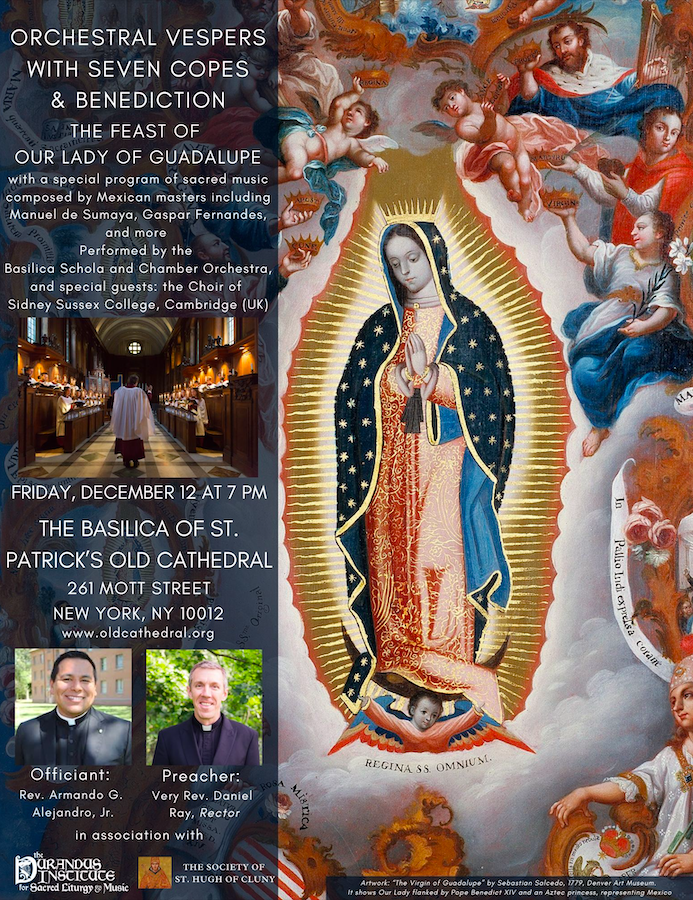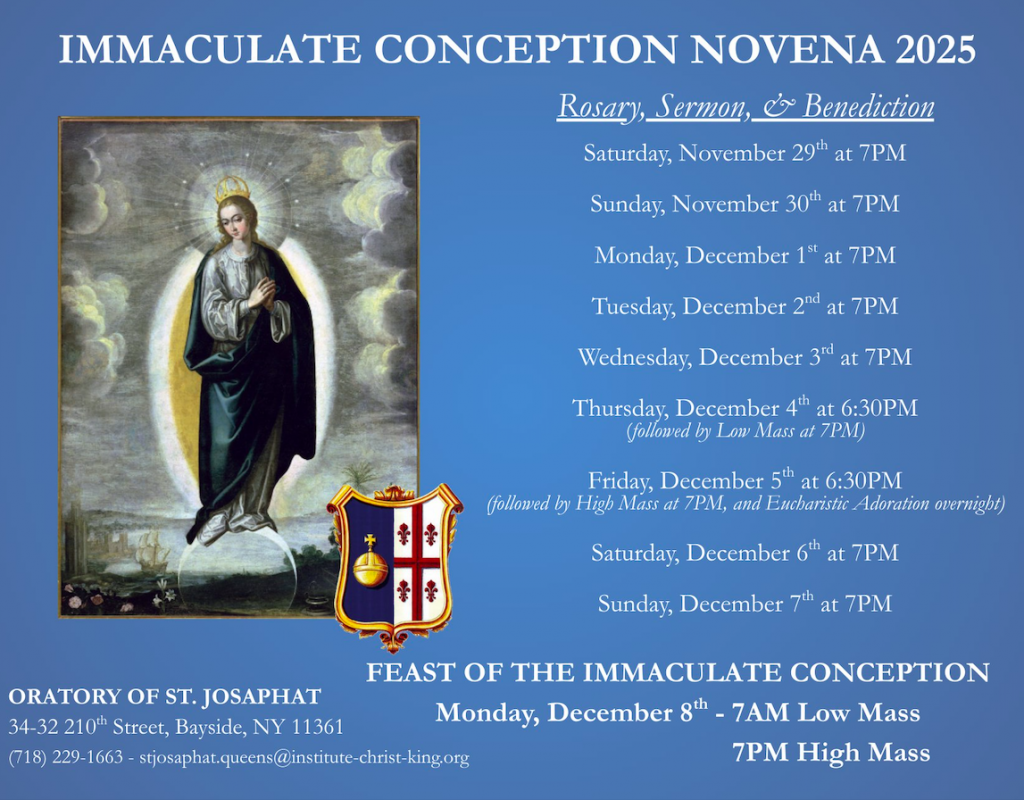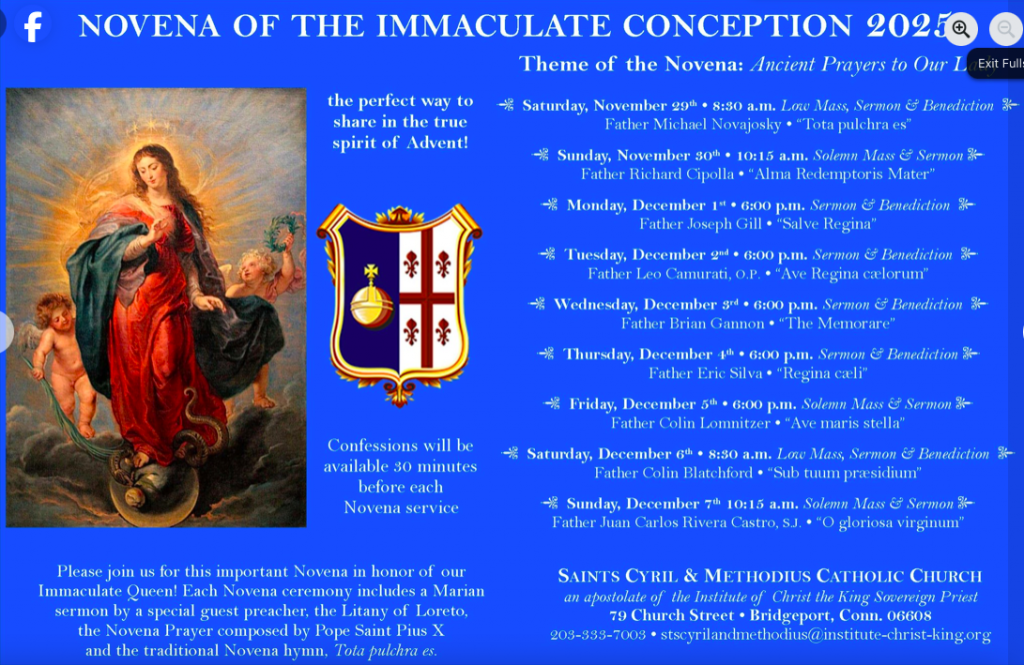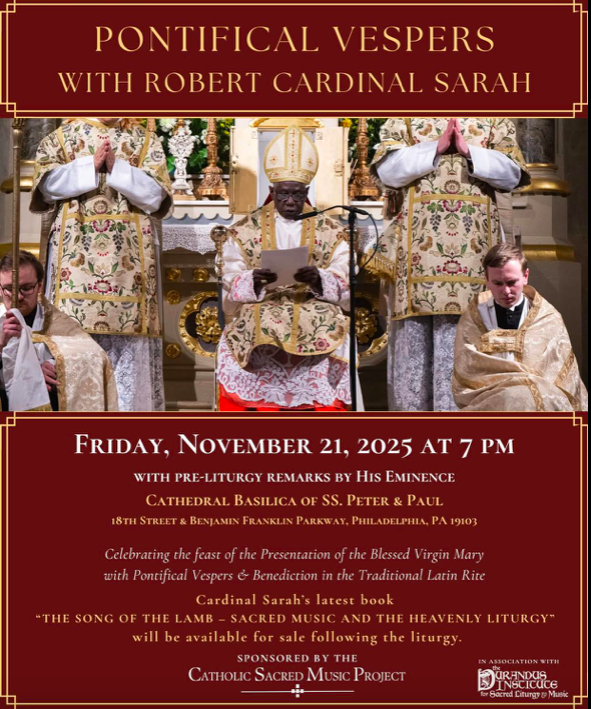
3 Dec
2025
1 Dec
2025
Solemn Vespers at Basilica of St. Patrick’s Old Cathedral in Manhattan
Posted by Stuart Chessman Published in Events28 Nov
2025
Immaculate Conception Novena at St. Josaphat Oratory in Queens
Posted by Stuart Chessman Published in Events24 Nov
2025
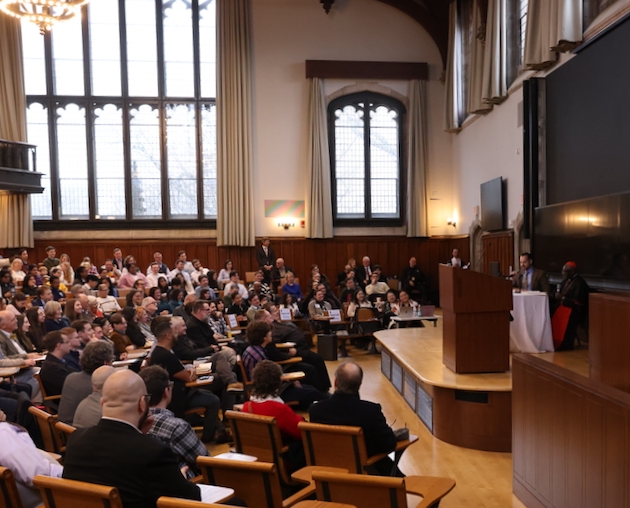
One of the largest lecture halls at Princeton University Is nearly completely full Saturday afternoon. The attendees are young and enthusiastic. For the Aquinas Institute, the Catholic chaplaincy at Princeton University, is hosting Cardinal Sarah. The Cardinal has just published a book – The Song of the Lamb – written in conjunction with Peter Carter, the music director of the Aquinas Institute about music and the faith.
The Cardinal first gave a lecture and then entered into a wide-ranging dialogue with Peter Carter. In the course of the afternoon Cardinal Sarah touched on many topics of which I can capture only a small selection. He spoke of how he had learned in his village from his parents and a French missionary that there is a different kind of music for the church, one rightly called sacred. He spoke of how chant always has the priority of place and of the importance of the Latin language. The liturgy is not something that we do or we create but something that Christ, dwelling within us, performs. Active participation does not mean uniformity. There are different roles within the liturgy: the celebrant, the choir, the congregation each has a different role to play but they are all working together in the one action. Each is participating actively but in different ways.
Again and again, Cardinal Sarah returned to the importance of music. Perhaps paradoxically, music is where our heart speaks to God without words. Music is essential to the liturgy – not a nice addition to it. And Gregorian chant is not something we made up but was given to us.
Cardinal Sarah spoke of the injustice of the persecution of those within the Church who follow the old rite of the Mass. We should pray that the Holy Spirit inspires Pope Leo to liberate this Mass and the Latin language in general. I note that the cardinal did not give any indication whether he thinks Pope Leo will actually do this.
Speaking of inculturation, he remarked that what the liturgy can convey is unity with other Christians at the present time in other parts of the world and throughout history. In the liturgy we are not trying to express ourselves, our identity or our culture. We should not seek to cut ourselves off from other cultures but to join with them.
As to Africa, the Church has found a new home there because the African is still open to God. There obviously remain tremendous problems and challenges in that continent. Nevertheless, this openness of the African culture to God can help other peoples (re)discover the primacy of God.
We should not prioritize too much “understanding” the liturgy. Cardinal Sarah noted that even in our own language we cannot understand the mysteries of the Catholic faith. Understanding is not sufficient. Sarah pointed out, for example, that even though the liturgy has been translated into German, the German Church is anything but a role model, what with their demands to change doctrine, to ordain women as priests, etcetera….
At the end we must always return to the need for evangelization and above all must evangelize our fellow Christians. In places like Europe many are baptized but not evangelized. We should recall that we are not just another Christ but Christ himself in this world. And to do this we should strive to “be holy.”
At the conclusion of the talk and interview Cardinal Sarah offered to sign his book. A very significant percentage of the listeners took him up on it and formed a long line to obtain the signature. All at all, it was a remarkable experience.
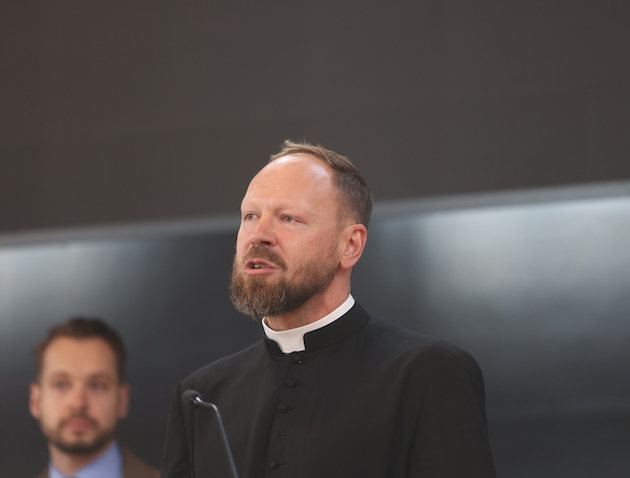
Fr.Zach Swantek, the chaplain of the Aquinas Institute, introduced the speakers. Those familiar with the Catholic chaplaincy at Princeton as it existed in the 1980’s are amazed at the progress.
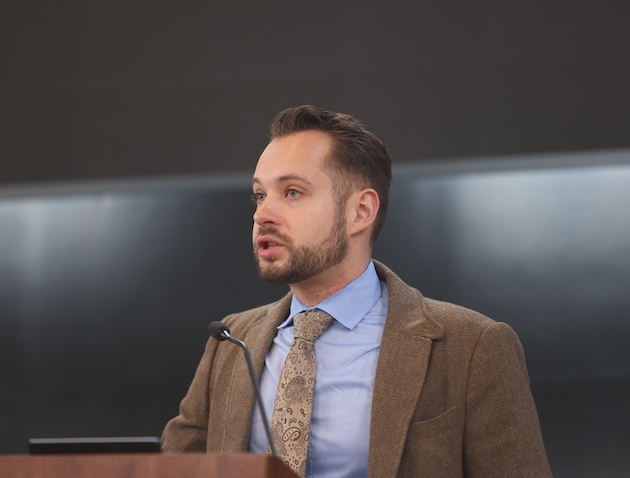
(above) Peter Carter.
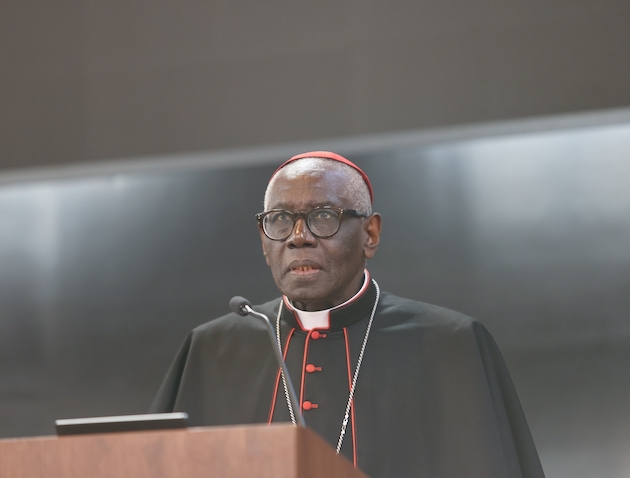
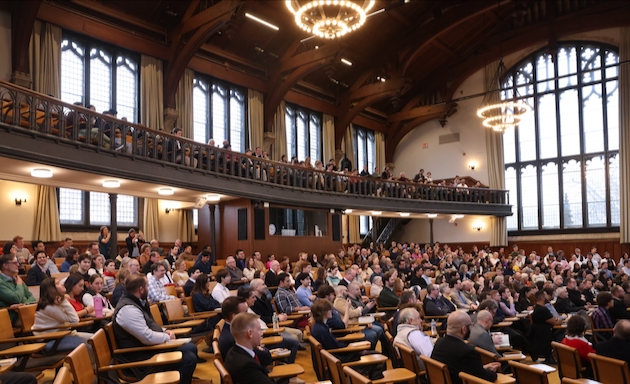
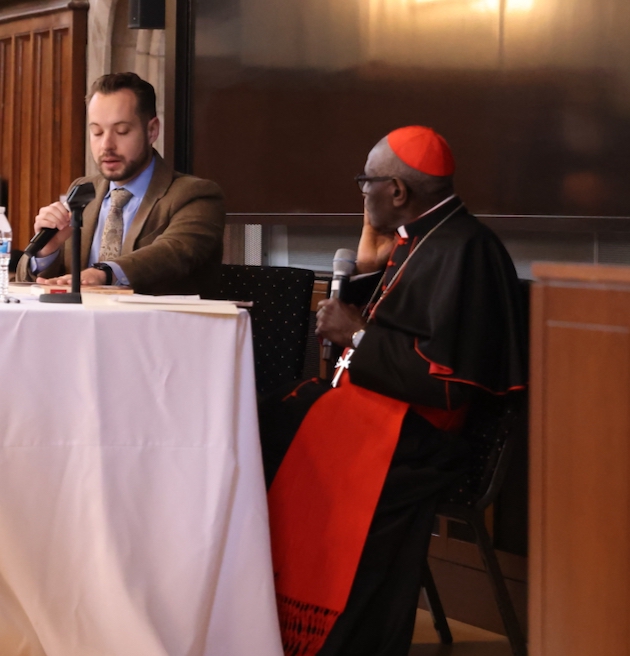
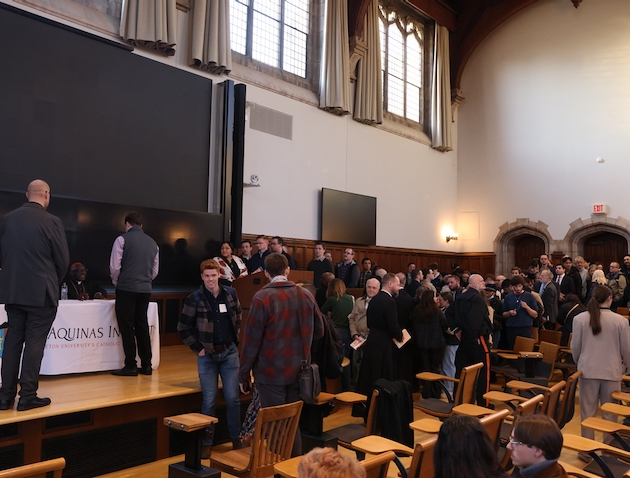
(Above) The long line forms for an autograph.
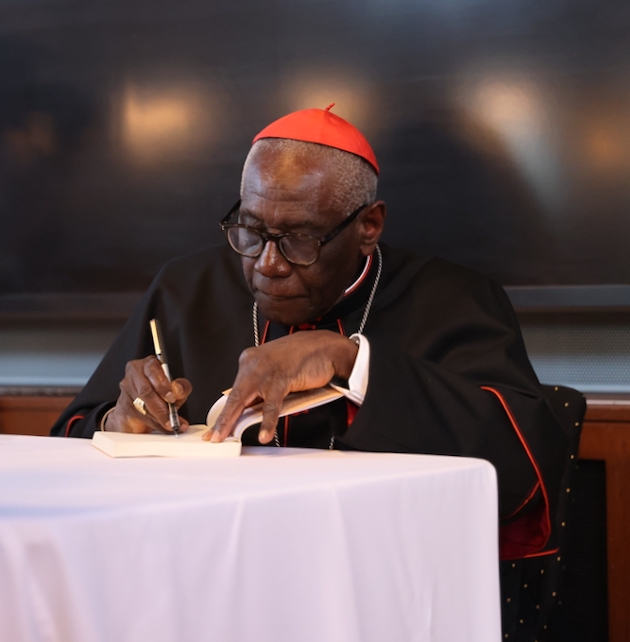
20 Nov
2025
12 Nov
2025
Pontifical Vespers with Cardinal Sarah in Philadelphia
Posted by Stuart Chessman Published in Events18 Oct
2025
Solemn Mass for Soul of Msgr. Ignacio Barreiro
Posted by Stuart Chessman Published in Events, Masses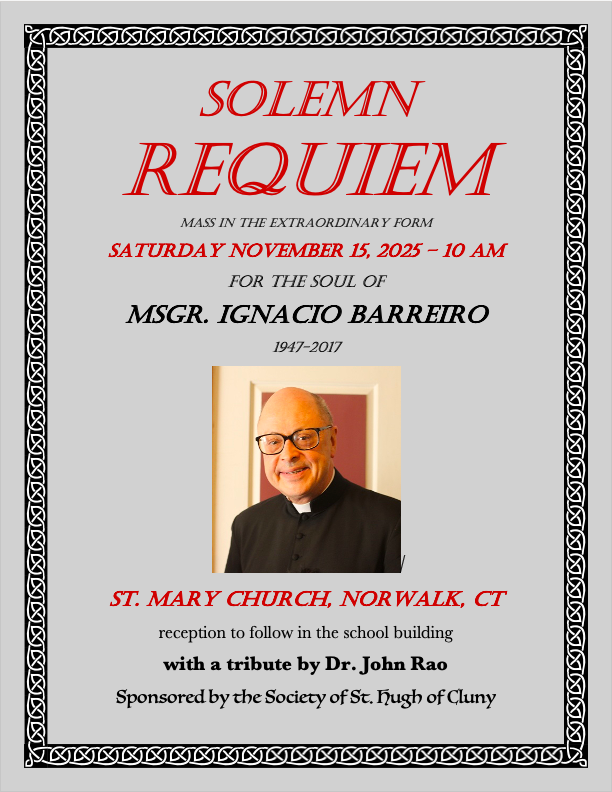
I hope as many of you who can will attend this Requiem Mass for Msgr. Barreiro. For many years he was a leader in the pro-life apostolate and in the cause of the Traditional Mass. A reception will follow the service at which Prof. John Rao will speak about the life of Msgr. Barreiro and the events of Catholic Traditionalist history in which he participated. Prof. Rao is eminently qualified for this task – he knew Msgr. Barreiro well and is currently working on a history of the development of Catholic Traditionalism.
13 Oct
2025
Petition to Cardinal Dolan to Save Most Holy Redeemer Church
Posted by Stuart Chessman Published in EventsPlease sign this open letter to Cardinal Dolan urging him to save Most Holy Redeemer Church.
Go to this link: https://c.org/tWwgFgd2PS
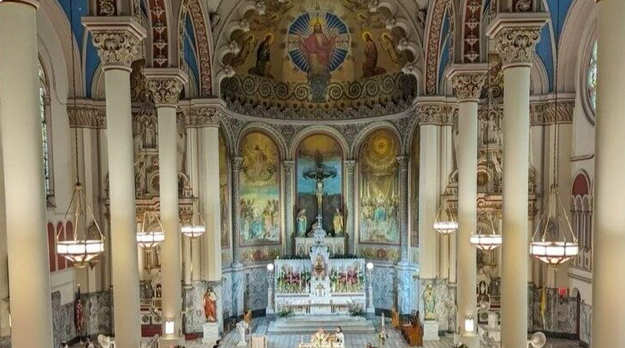
12 Oct
2025
National Latin Mass Pilgrimage in Washington
Posted by Stuart Chessman Published in Events, Photos, Traditionis Custodes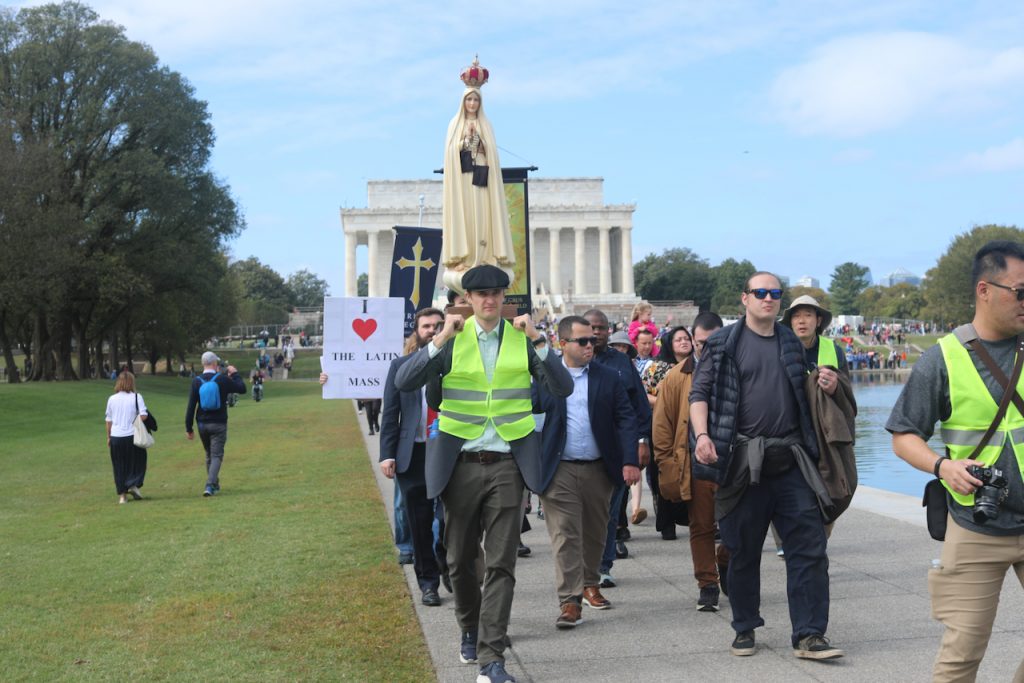
On Saturday, October 11, the National Latin Mass Pilgrimage took place once more. Its path lies between the Cathedrals of Arlington, Virginia and Washington DC (two dioceses which introduced some of the most confrontational measures against the Traditional Latin Mass). The Arlington Latin Mass Society sponsored the pilgrimage. Some 50 pilgrims took part. Now certainly dire forecasts of a looming weather disaster – which proved false – diminished participation. But I can’t ascribe the low turnout entirely to that. We also had noticed a declining numbers at our last visit to the pilgrimage. As in prior pilgrimages, the clergy were conspicuous by their abscence.
Numbers, however, are not everything. Among the pilgrims, spirits were high. This pilgrimage was, as in the past, well organized. And are there not prominent examples of pilgrimages that a smaller core group has preserved through the years that later flowered (in numbers) once again: the “Pilgrimage of the Restoration” in Auriesville, NY or even the “Pilgrimage of Christendom” in Chartres.
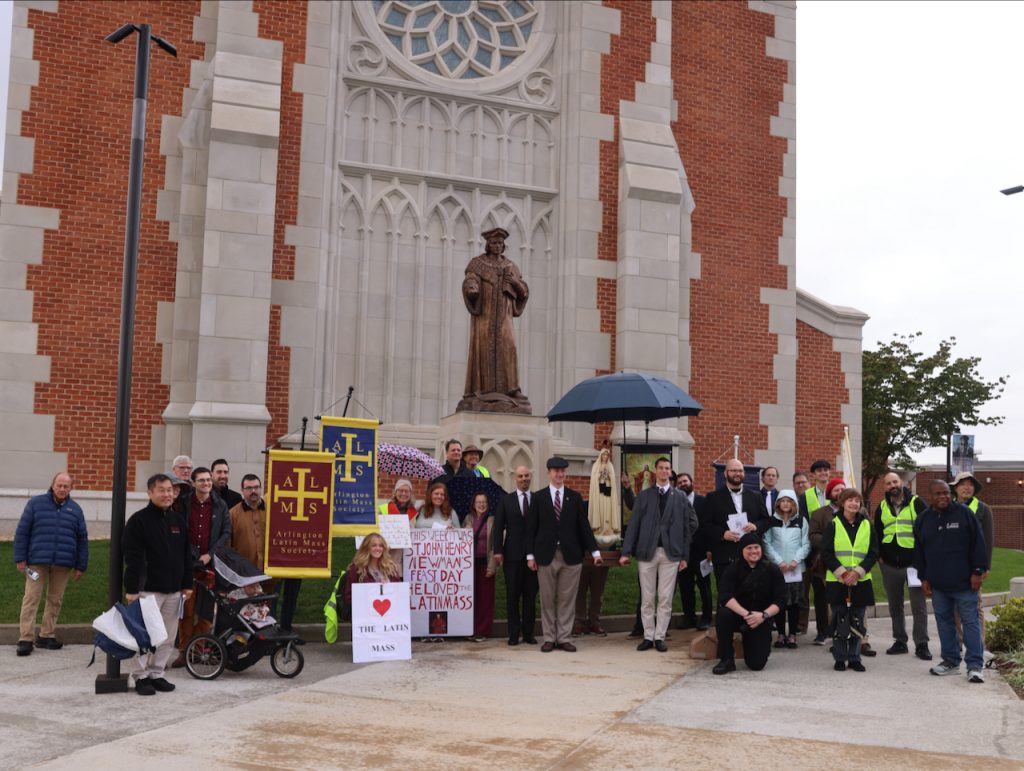
At the beginning it seemed that threatened rain-and windstorms might materialize. Later, the skies cleared and it turned out to be a beautiful day. (Above) In front of the cathedral of the Arlington diocese – with a statue of St. Thomas More looking down.
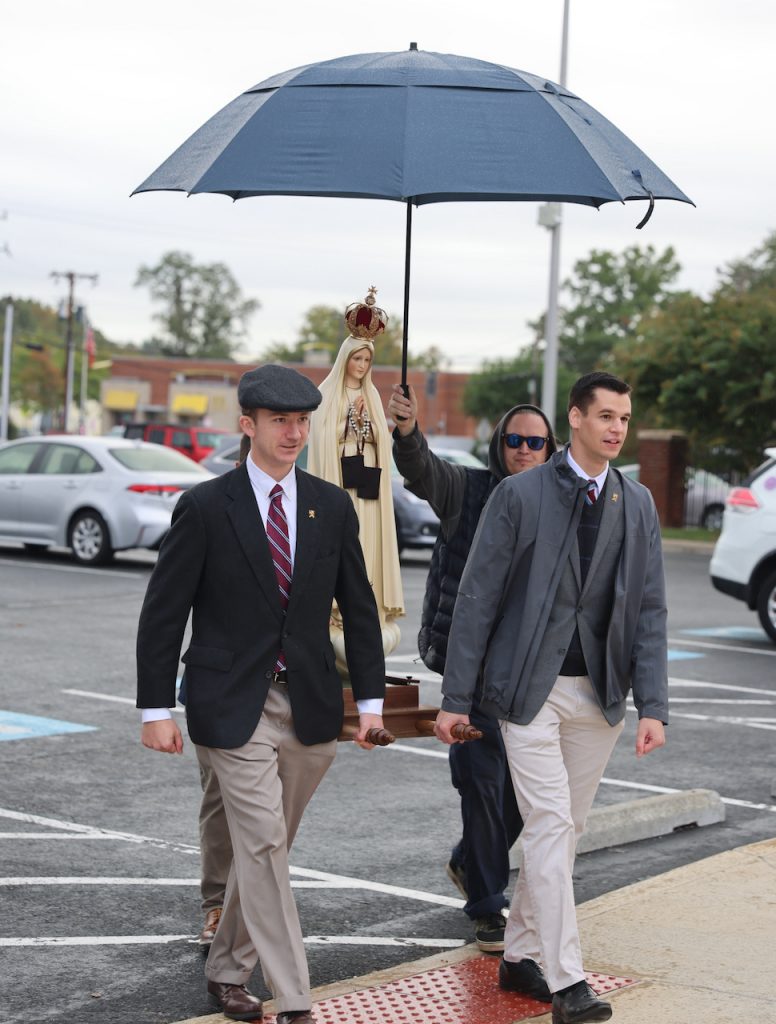
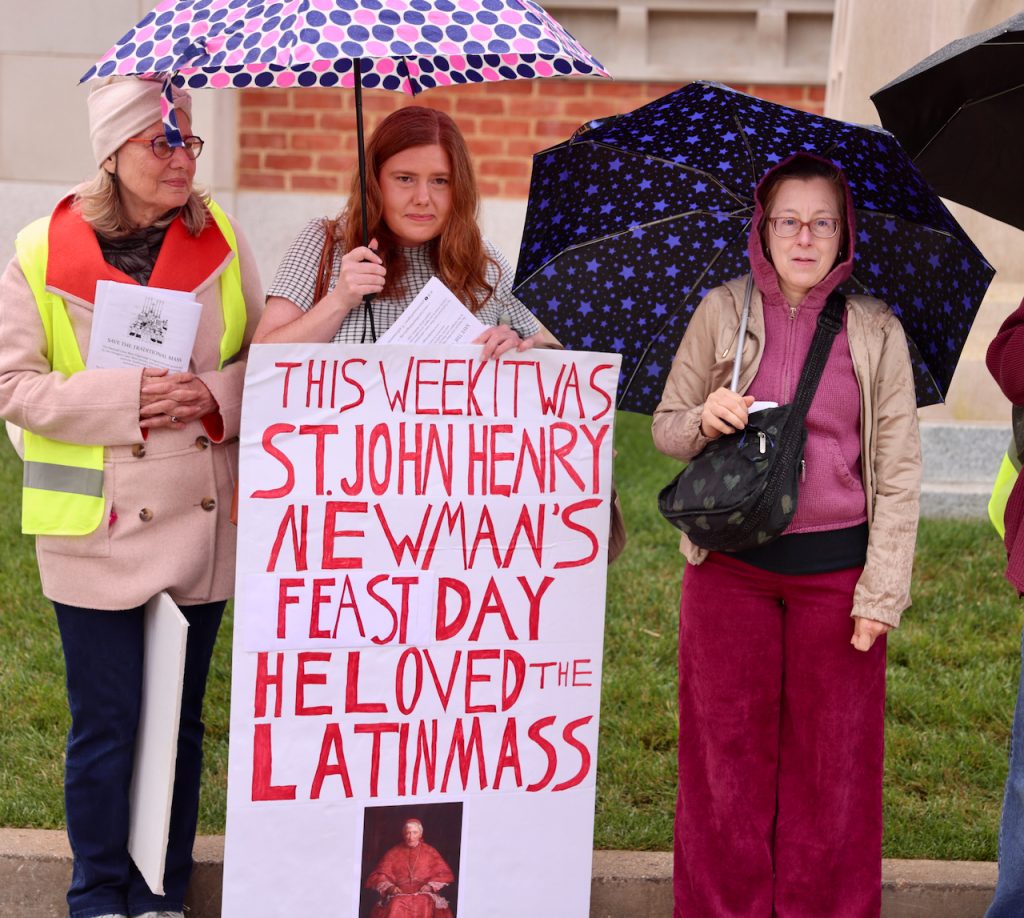
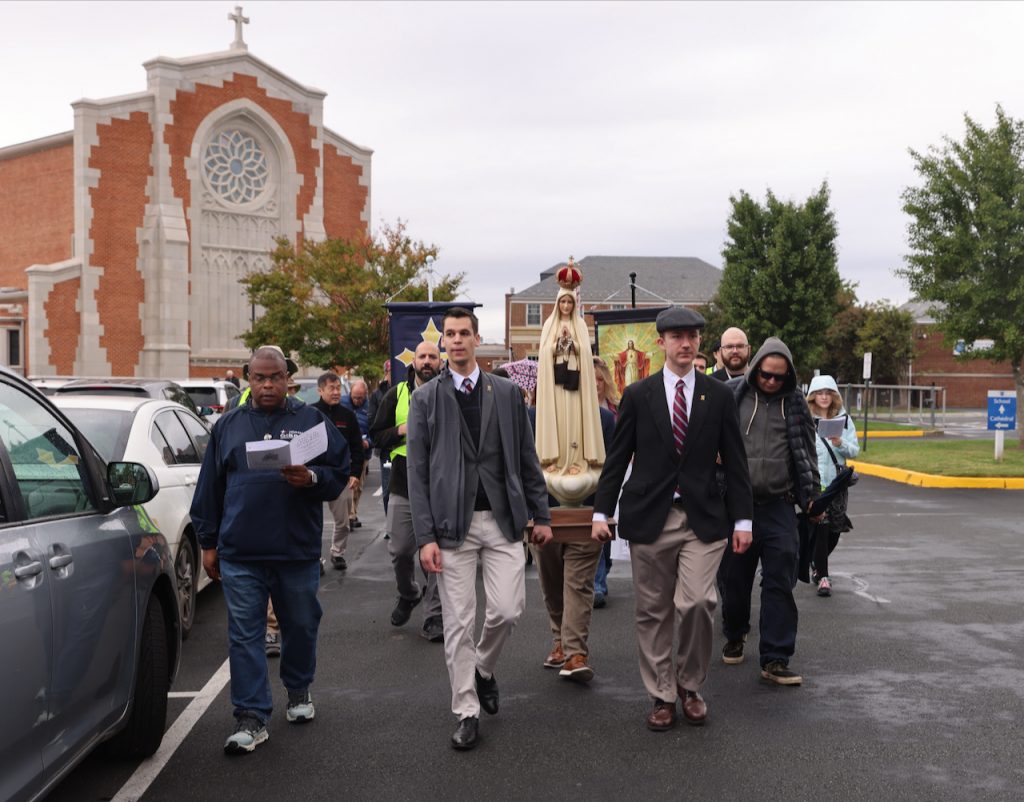
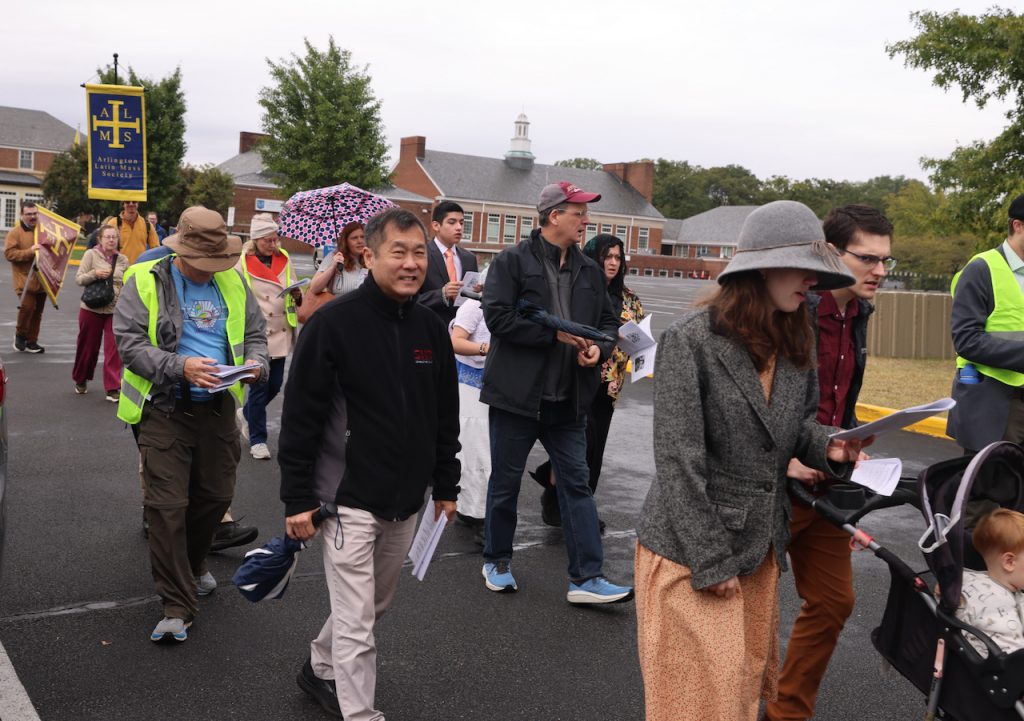
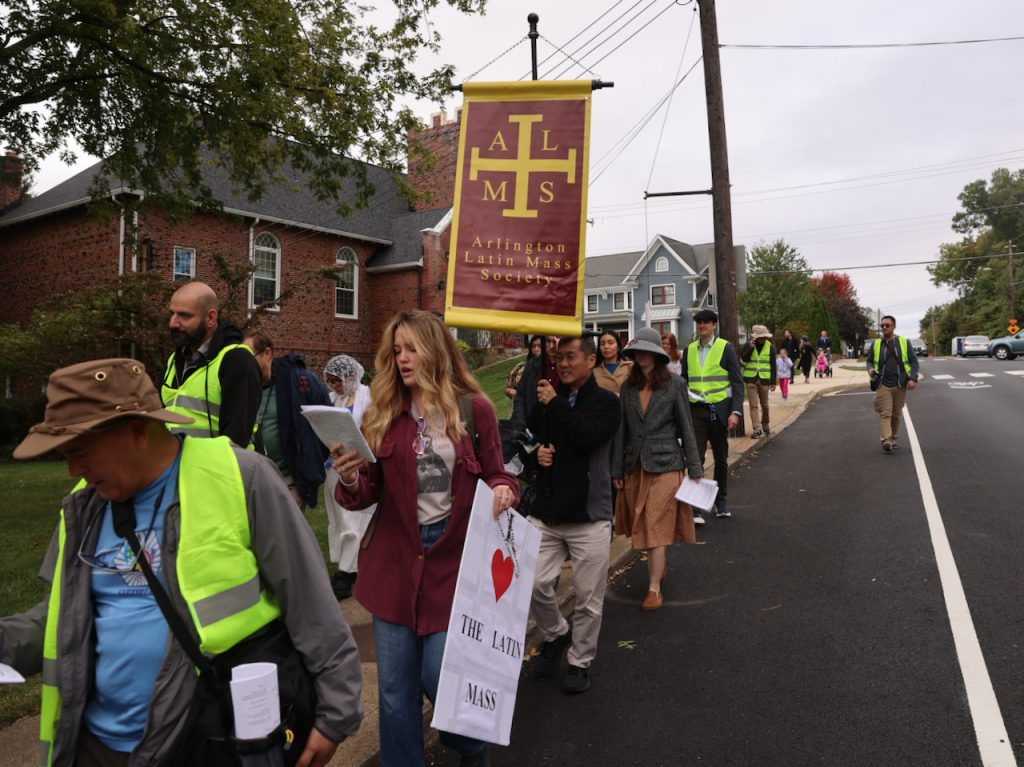
(Above) Chanting and praying the rosary. Sometimes cars honked approval.
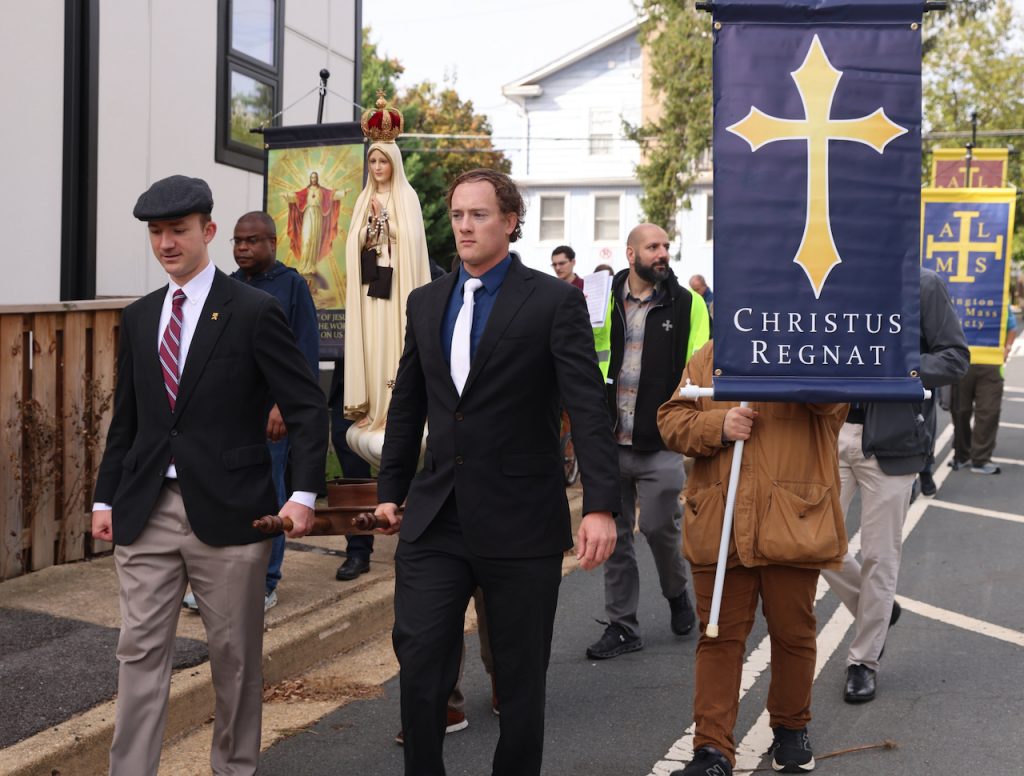
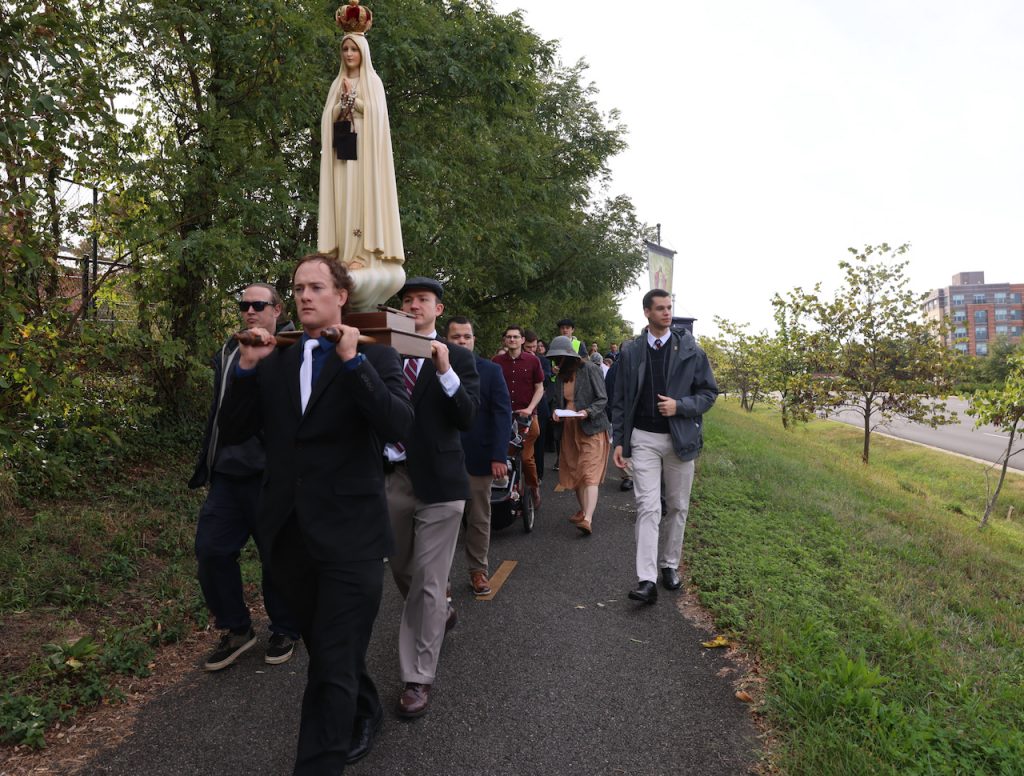
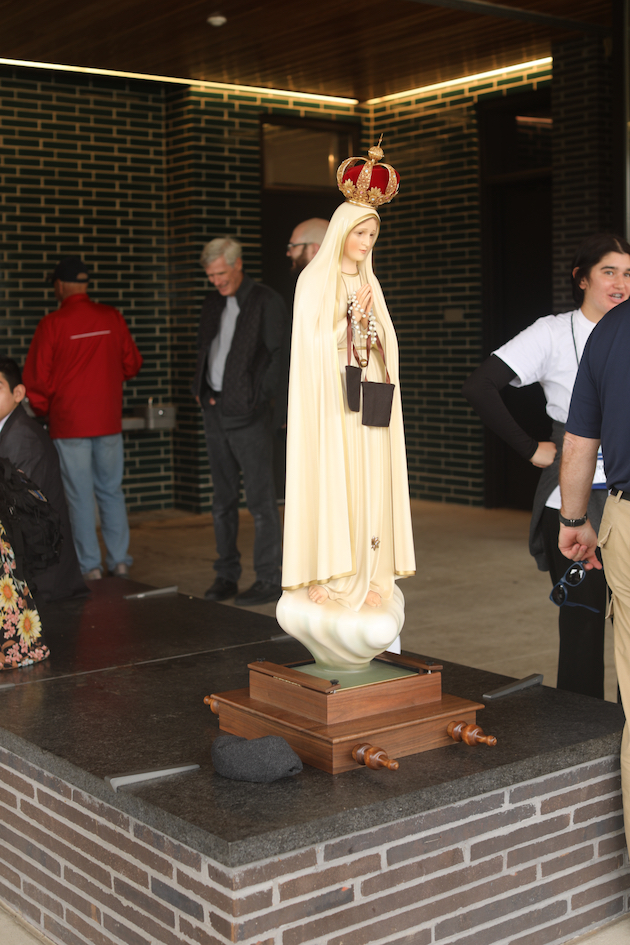
(Above) The Pilgrim Virgin – at the one rest stop for the pilgrims across from the Iwo Jima memorial.
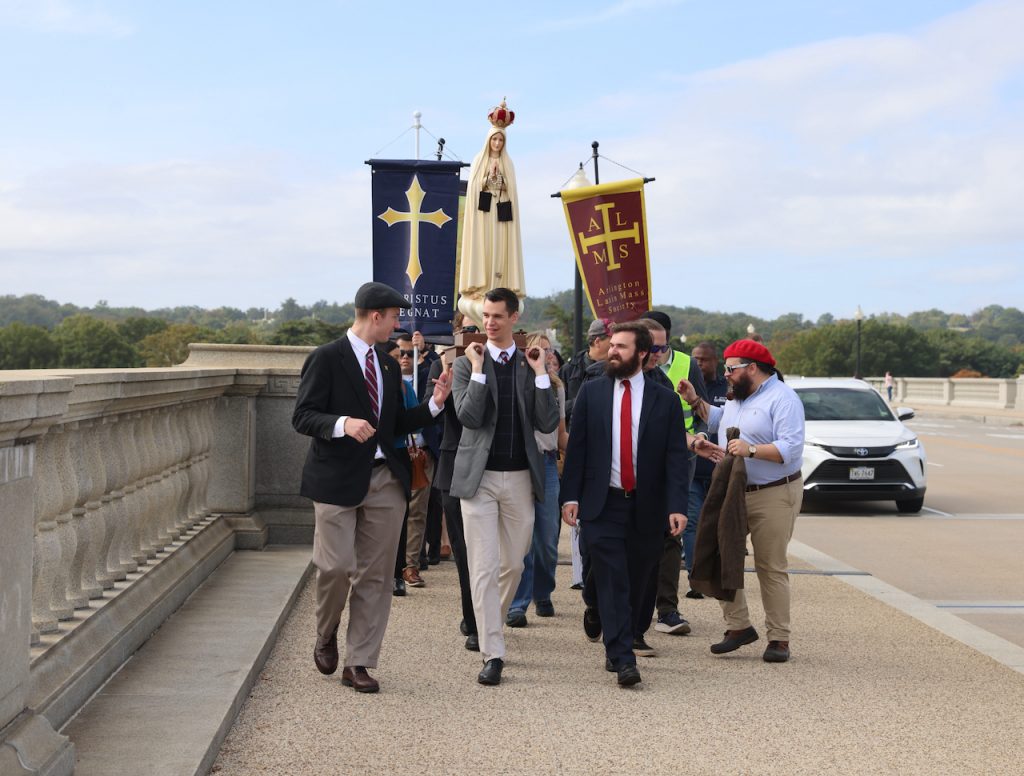
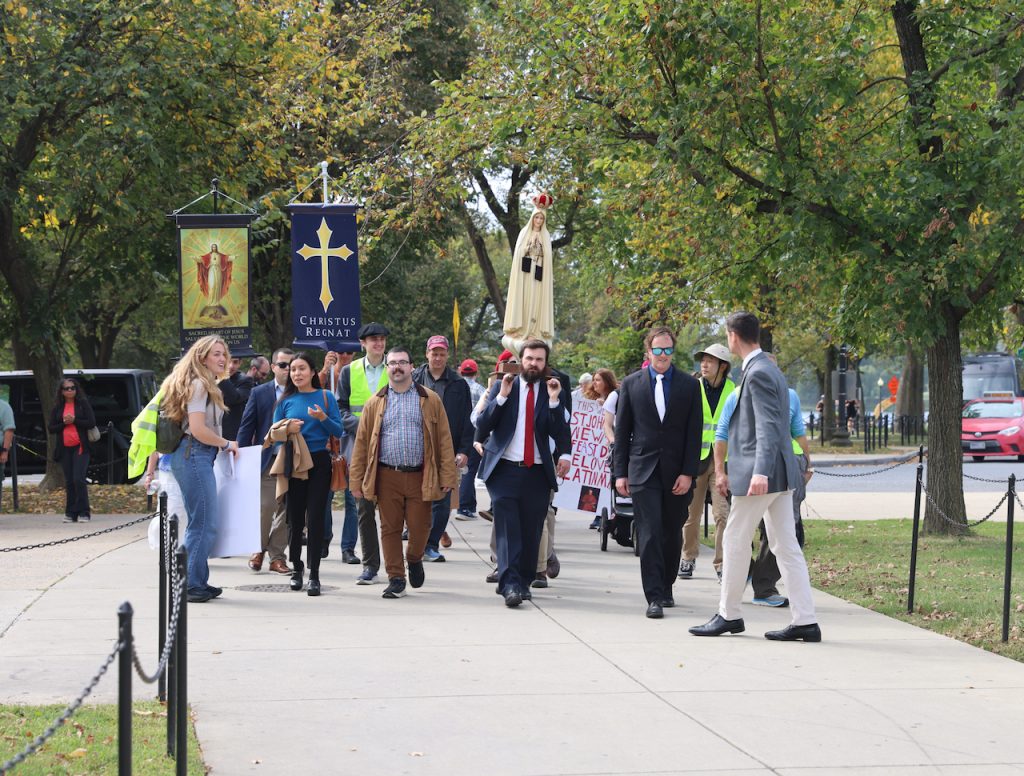
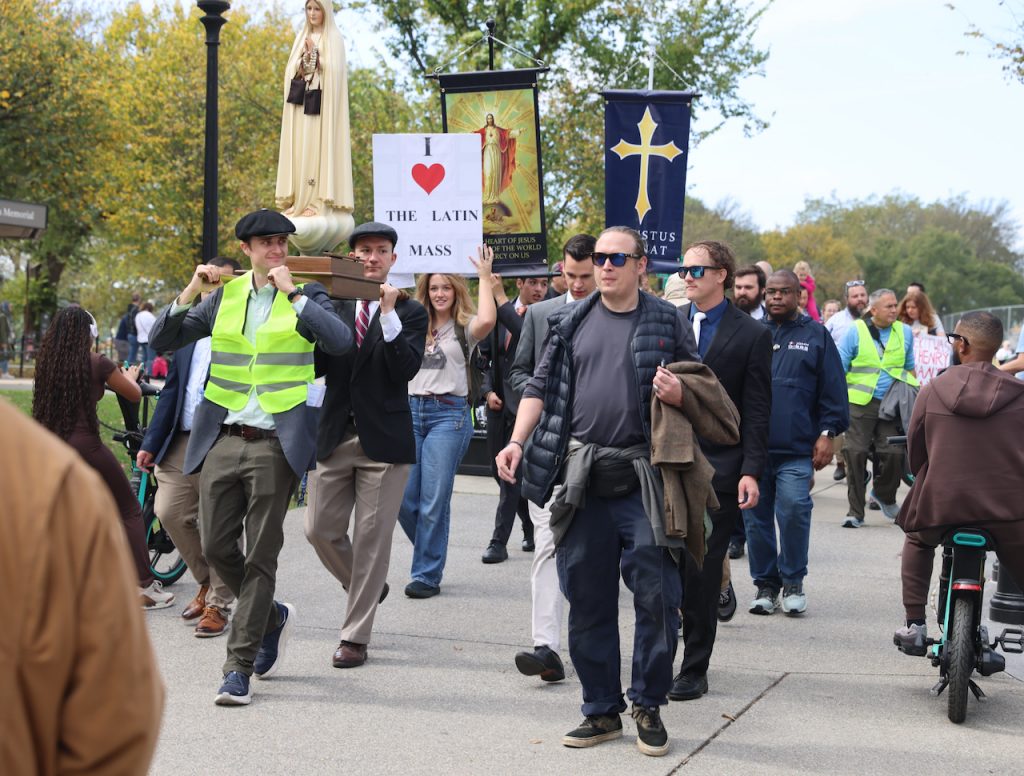
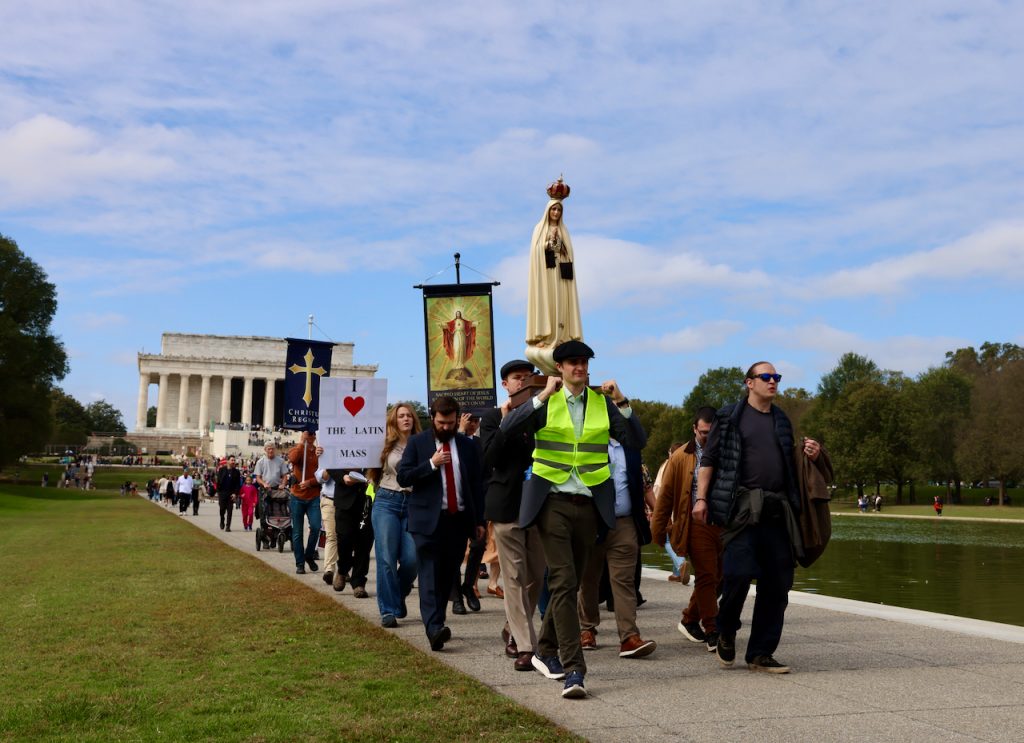
(Above) Processing onward from the Lincoln Memorial. The area around that monument was dominated by a deafening “Jesus Movement” event.
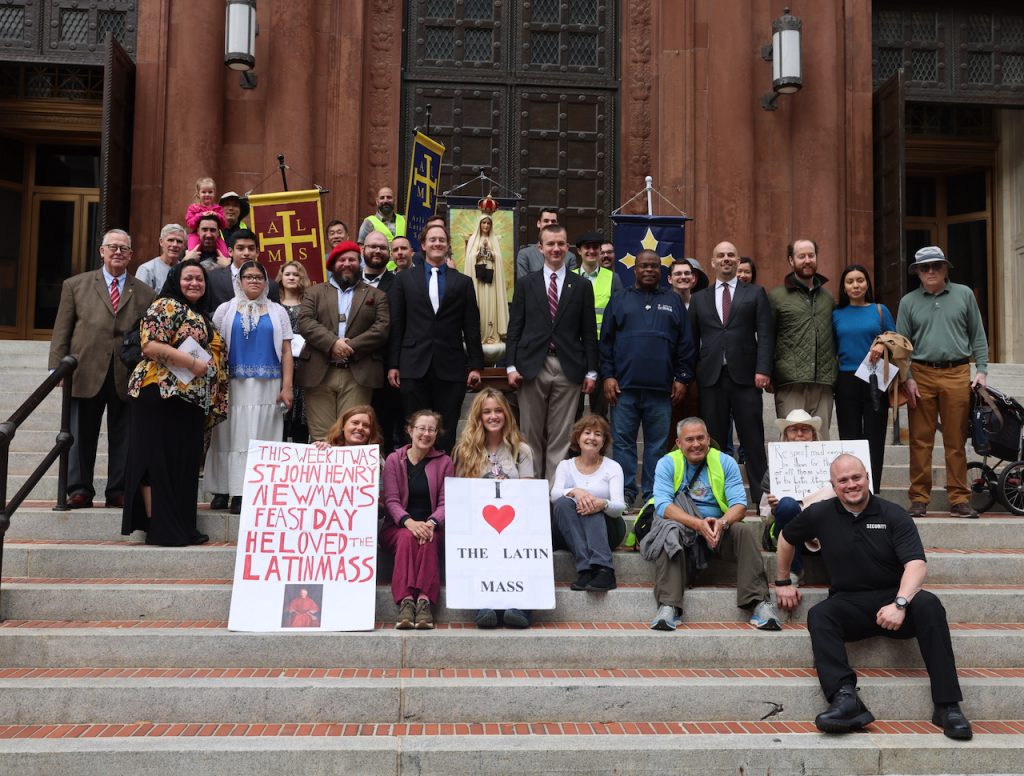
(Above) On the steps of St. Matthew Cathedral. The pilgrimage concluded with the chanting of None and Vespers on the steps of the Cathedral (not within it!).
29 Sep
2025

(Above) Arrival of the Pilgrims at the Shrine.
The Pilgrimage for the Restoration on its 30th Anniversary
Yesterday we had the joy to be present at the 30th “Pilgrimage for the Restoration” at the Shrine of the North American Martyrs in Auriesville, New York. It was a perfect day for this event. The contingents of pilgrims made their way to the shrine carrying their banners and often pushing their strollers; their order, discipline and demeanor were impressive. As far as I could see, the organization of the event seemed very thorough and competent.
Over the years the details of this pilgrimage – the overall itinerary, the day of arrival and the program of the final day – have frequently varied. This year, on reaching Auriesville on Sunday, the pilgrims first descended into the ravine – the most secluded and sacred spot of the shrine grounds. For this is where St. Isaac Jogues buried the bones of his martyred companion St. Rene Goupil. Next, they processed to the Coliseum, where a Solemn Mass was celebrated, accompanied by splendid music and in the presence of a bishop. Finally, after the conclusion of the Mass, relics of the saints revered in Auriesville were reverenced.
If numbers alone were the only criterion of success, this year’s Pilgrimage for the Restoration was an outstanding achievement. One of the leaders estimated there were 700 to 800 pilgrims present; more may have joined for the concluding Mass. It is a dramatic improvement in participation compared to the situation around 2013.
Now the Pilgrimage for the Restoration began in grandly successful style in the1990s. Numerous organizations participated, and a large congregation attended the concluding Mass in the Coliseum. Among other reasons for this impressive achievement was the uniqueness of this liturgy at that time in North America: it was one of the few occasions at which a traditionalist could experience a Solemn (or Solemn High ) Mass.
Already by 2008, however, attendance at the pilgrimage was decreasing. Was it the increasing availibility of more convenient traditional Masses? Or perhaps some foolishly thought “restoration” of the traditional liturgy had been achieved and no further work was needed? By 2013 the pilgrimage had dwindled to an affair of some 100-200 pilgrims. Then, the Jesuits in charge of the shrine started to exclude the pilgrims from the Coliseum. When, in 2015, the Jesuits abandoned most of the Auriesville site it even seemed as if the shrine might permanently close.
Perhaps recovery started precisely with the exit of the Society of Jesus from the shrine in 2015. For the new owners refurbished run-down grounds and buildings and were more welcoming to the Traditional Mass. The persecution of the traditionalists by Pope Francis starting in 2021 undoubtedly helped to reenergize the commitment of traditionalists to this pilgrimage. Finally, the emergence of competition in North America, notably the Three Hearts pilgrimage in Oklahoma, may have also incentivized participants in this part of the country.
Let us recall that the Chartres pilgrimage, the original model and inspiration for the Pilgrimage for the Restoration, also descended for a time into routine – perhaps even stagnation. But in the last several years the Pilgrimage of Christendom in France has enjoyed record attendance, in good weather and in bad. So much so that its success has become a major concern for the Vatican and the French hierarchy. But these impressive results could only have been achieved thanks to the persistence of the pilgrims through the leaner years. The same is true in Upstate New York: the persistence of the traditionalist pilgrims to Auriesville year after year – and the organizers – preserved the pilgrimage and laid the foundation for this year’s success.
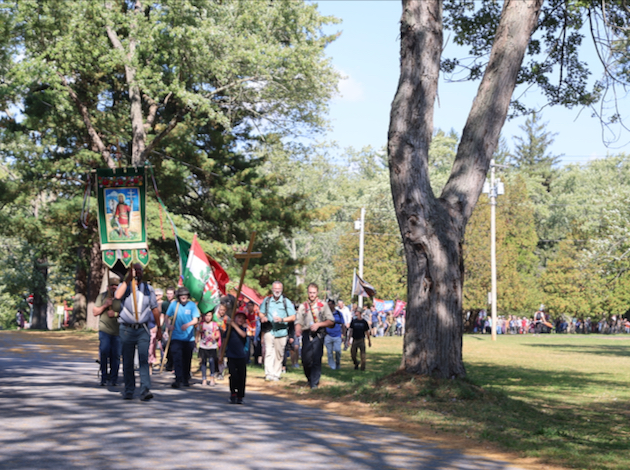
(Above and below) The arrival of the pilgrims.
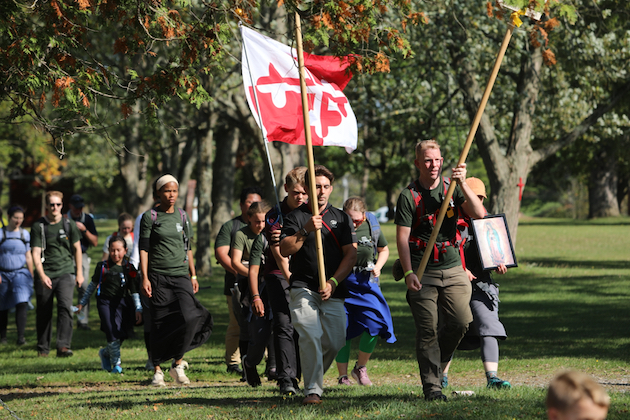
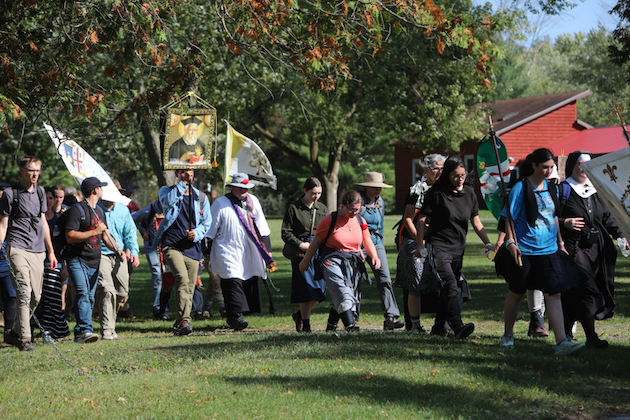
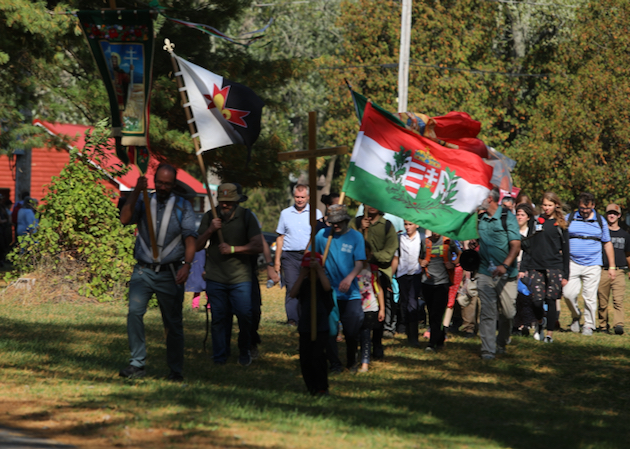
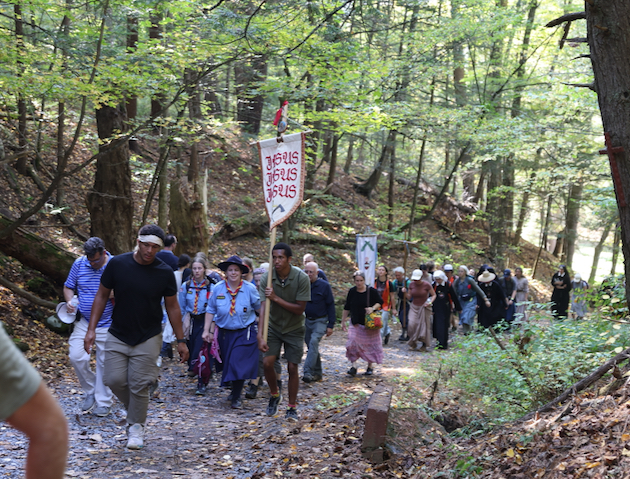
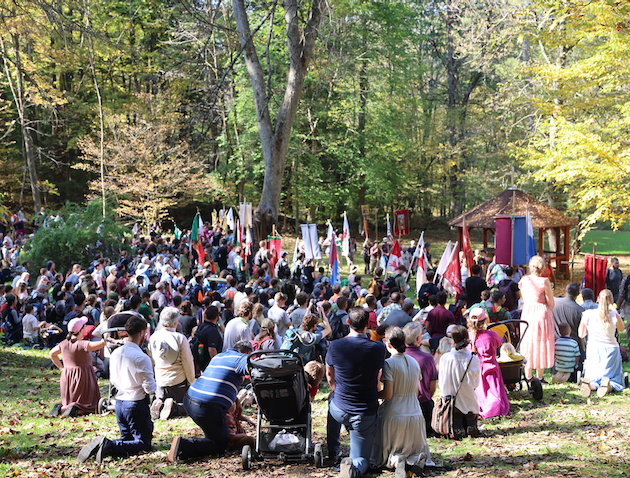
(Above) Prayer in the Ravine.
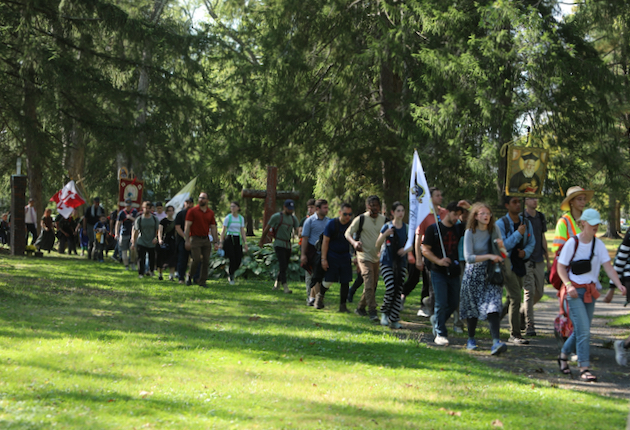
(Above and below) Processing from thr Ravine to the Coliseum.
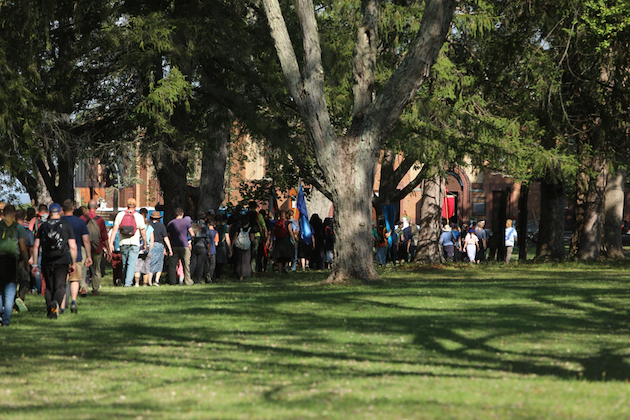
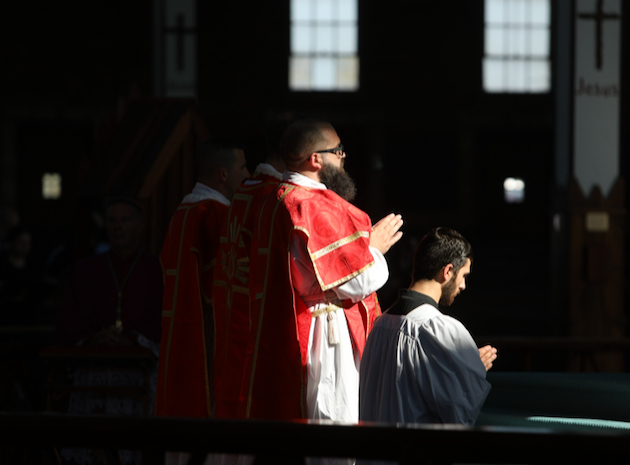
The start of the Mass.
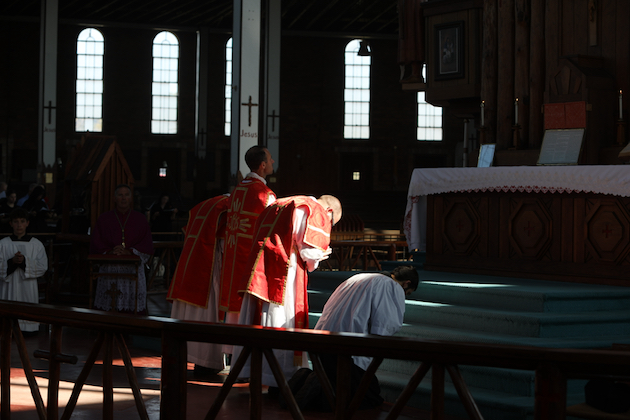
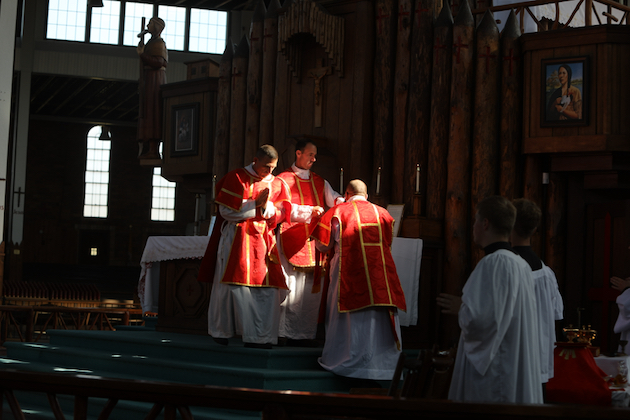
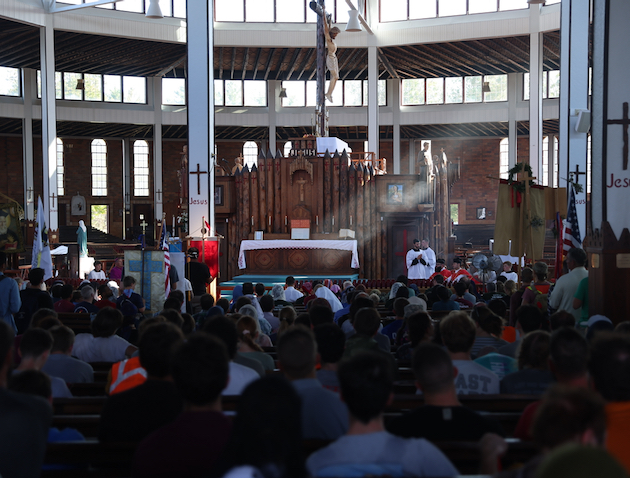
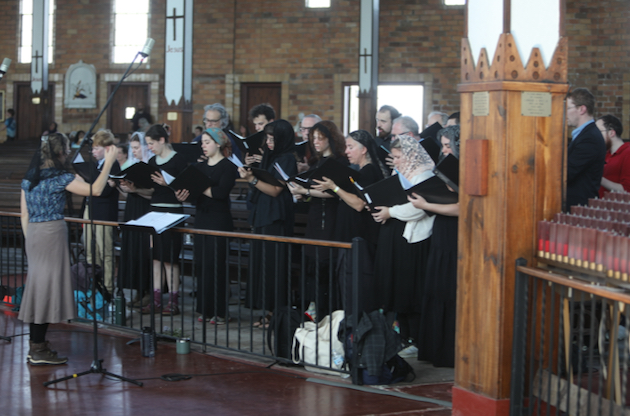
(Above) The choir was excellent.
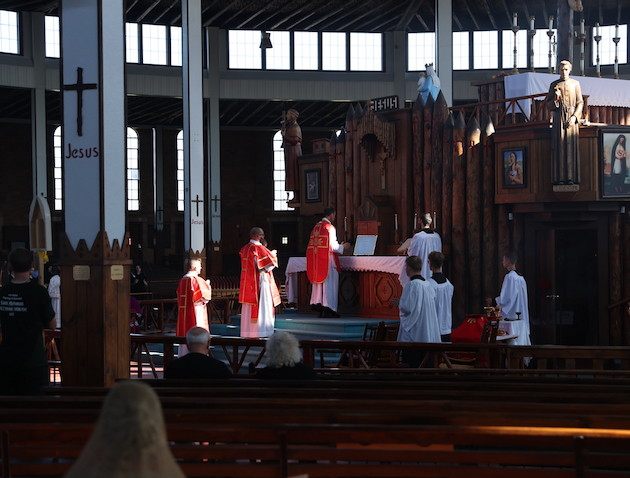
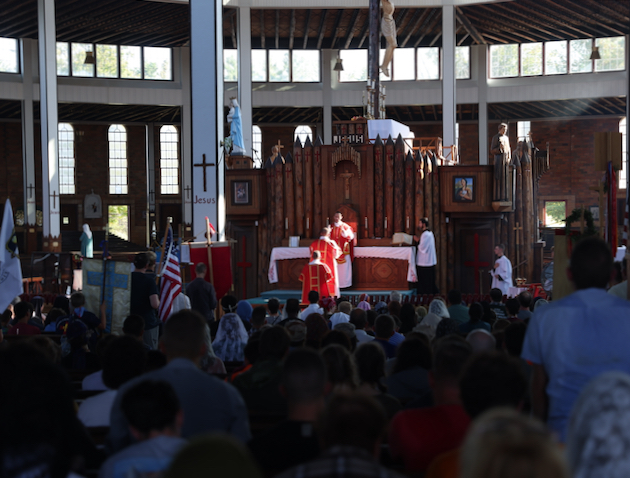
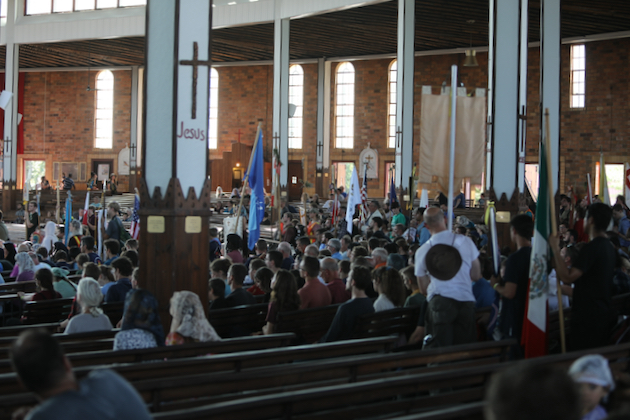
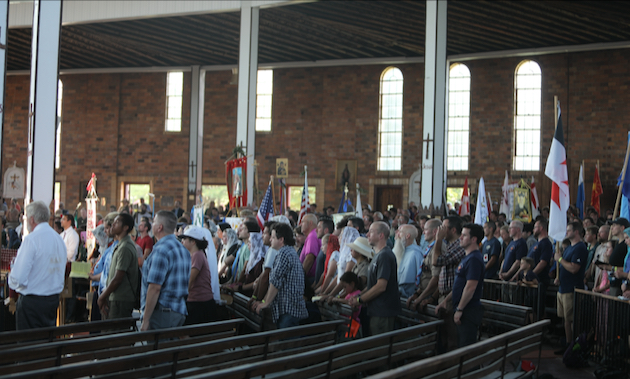
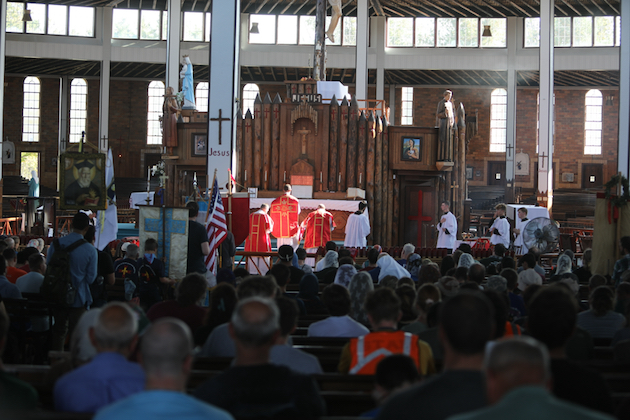
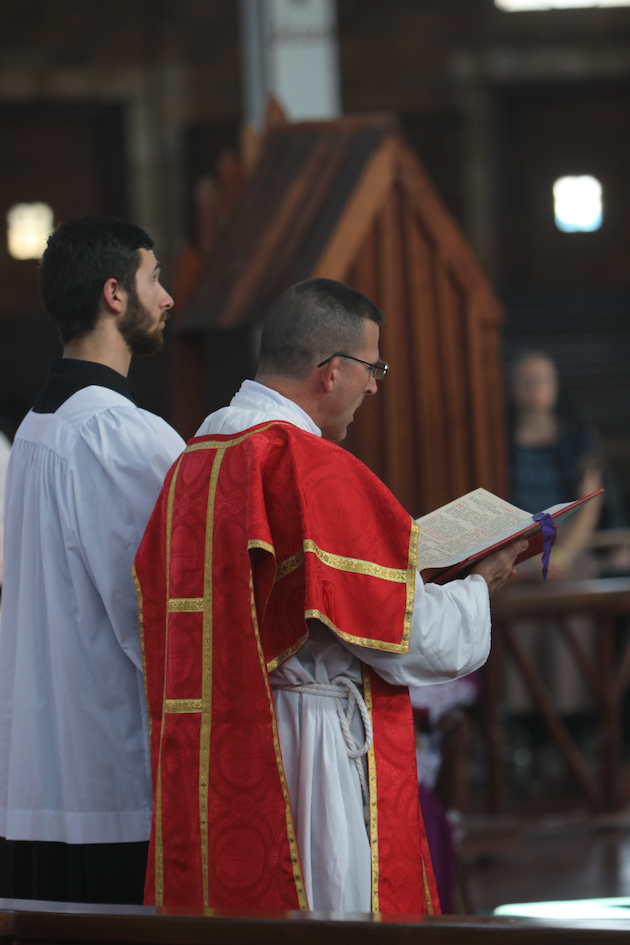
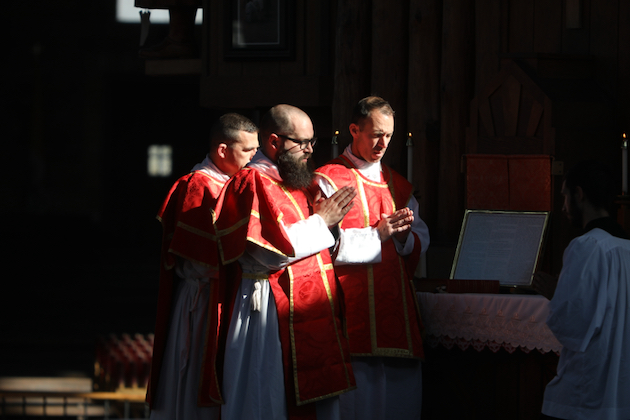
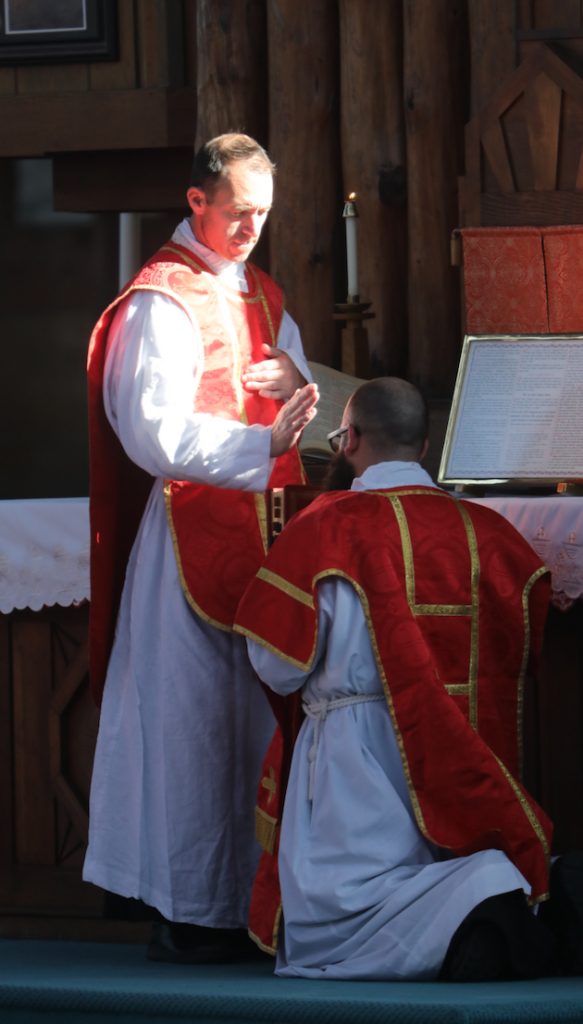
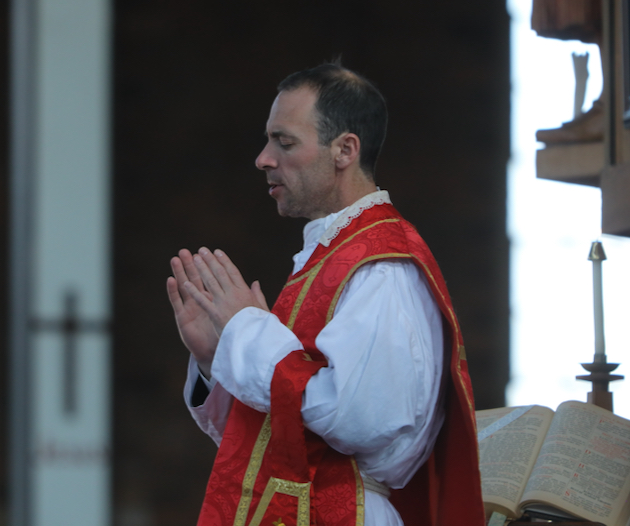
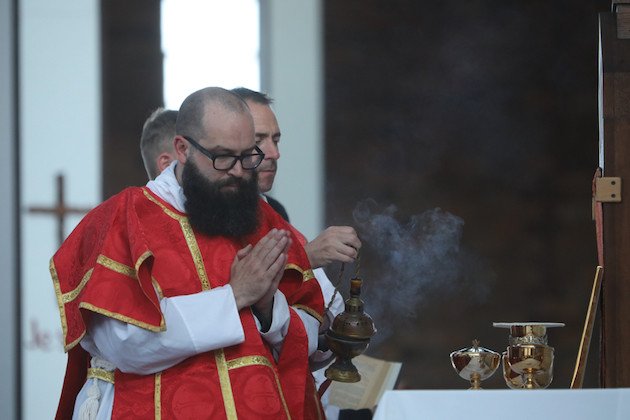
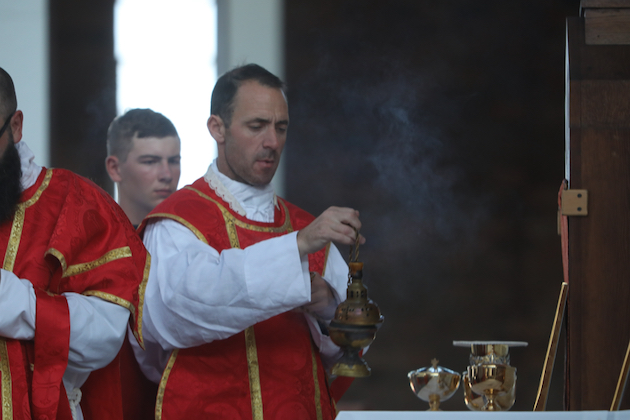
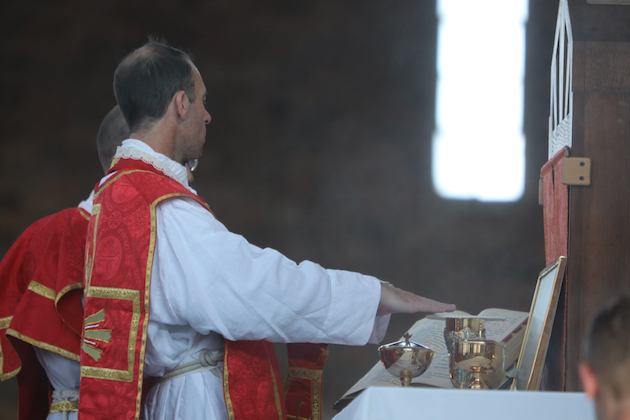
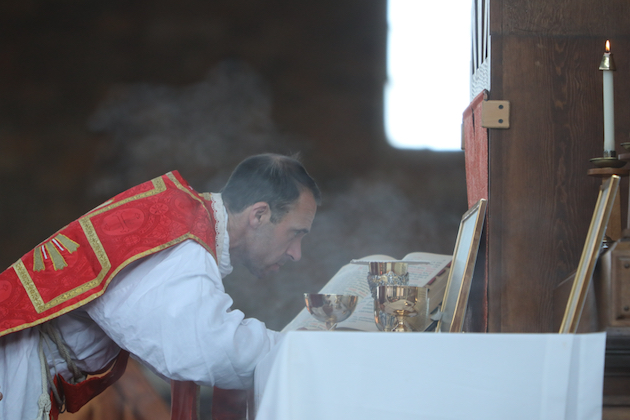
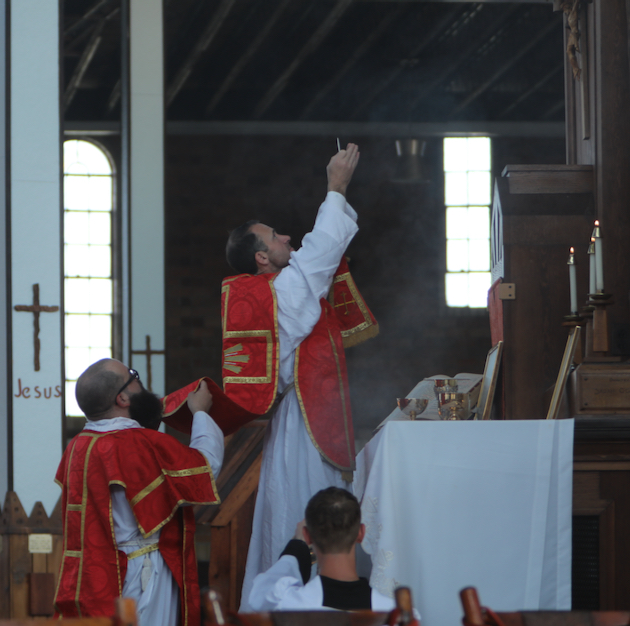
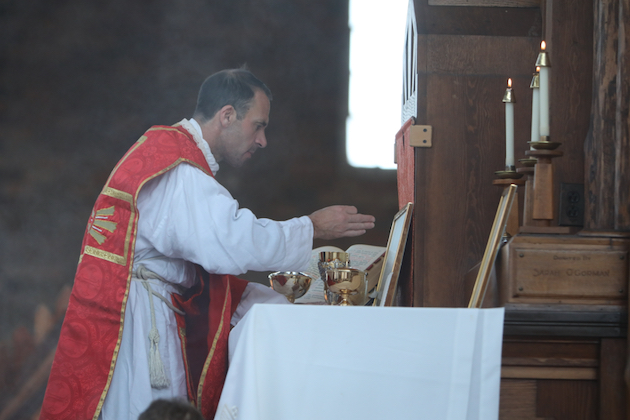
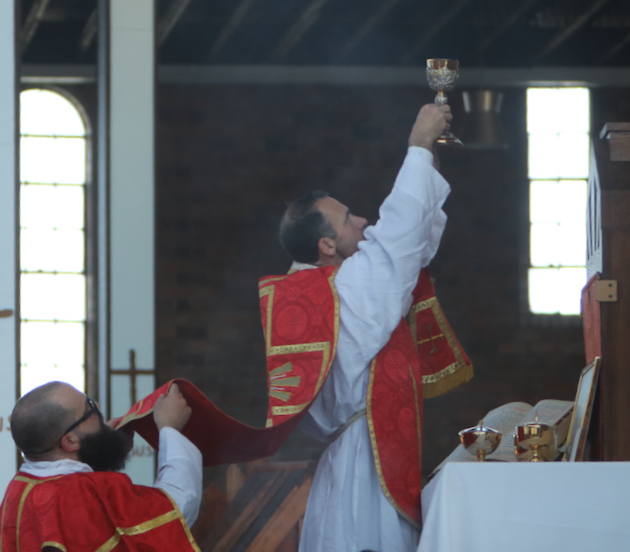
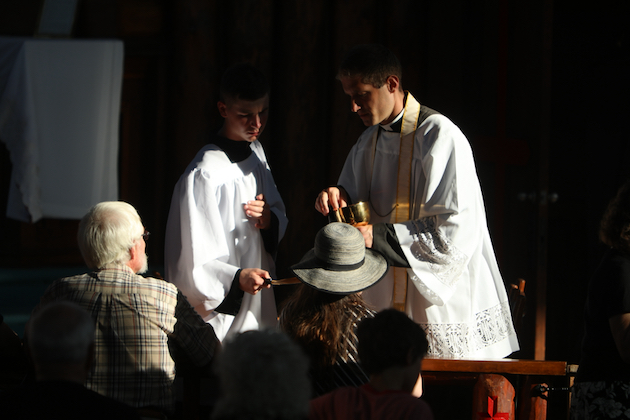
Contact us
Register
- Registration is easy: send an e-mail to contact@sthughofcluny.org.
In addition to your e-mail address, you
may include your mailing addresss
and telephone number. We will add you
to the Society's contact list.
Search
Categories
- 2011 Conference on Summorum Pontifcum (5)
- Book Reviews (99)
- Catholic Traditionalism in the United States (27)
- Chartres pIlgrimage (17)
- Essays (179)
- Events (686)
- Film Review (7)
- Making all Things New (44)
- Martin Mosebach (35)
- Masses (1,363)
- Mr. Screwtape (46)
- Obituaries (19)
- On the Trail of the Holy Roman Empire (24)
- Photos (350)
- Pilgrimage Summorum Pontificum 2021 (7)
- Pilgrimage Summorum Pontificum 2022 (6)
- Pilgrimage Summorum Pontificum 2023 (4)
- Sermons (79)
- St. Mary's Holy Week 2019 (10)
- St. Mary's Holy Week 2022 (7)
- St. Mary's Holy Week 2023 (7)
- St. Mary's Holy Week 2024 (6)
- Summorum Pontificum Pilgrimage 2024 (2)
- Summorum Pontificum Pilgrimage 2025 (7)
- The Churches of New York (200)
- Traditionis Custodes (52)
- Uncategorized (1,393)
- Website Highlights (15)
Churches of New York
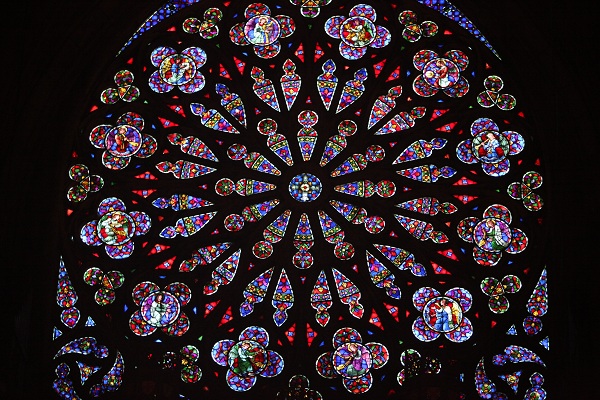
Holy Roman Empire
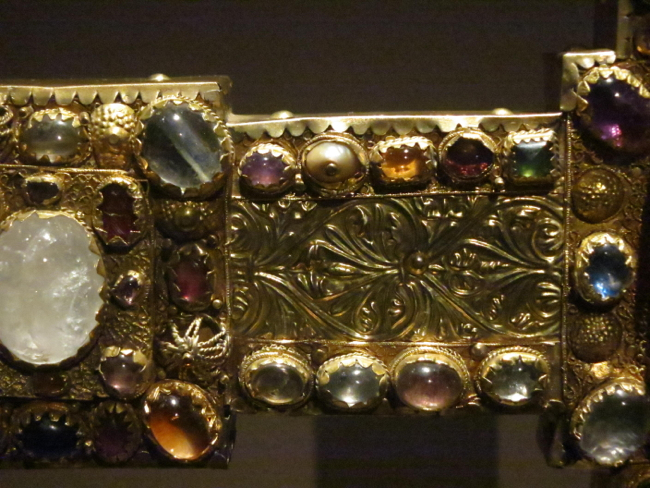
Website Highlights
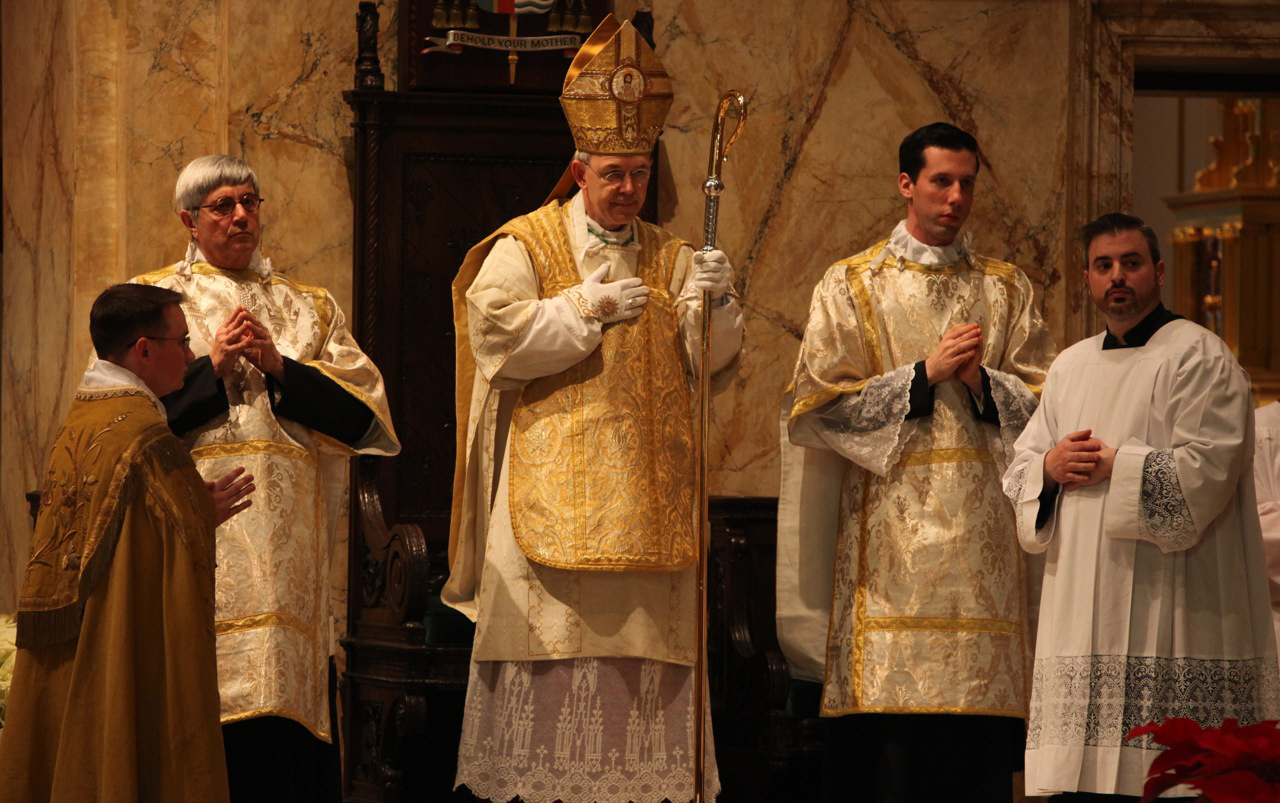
Archives
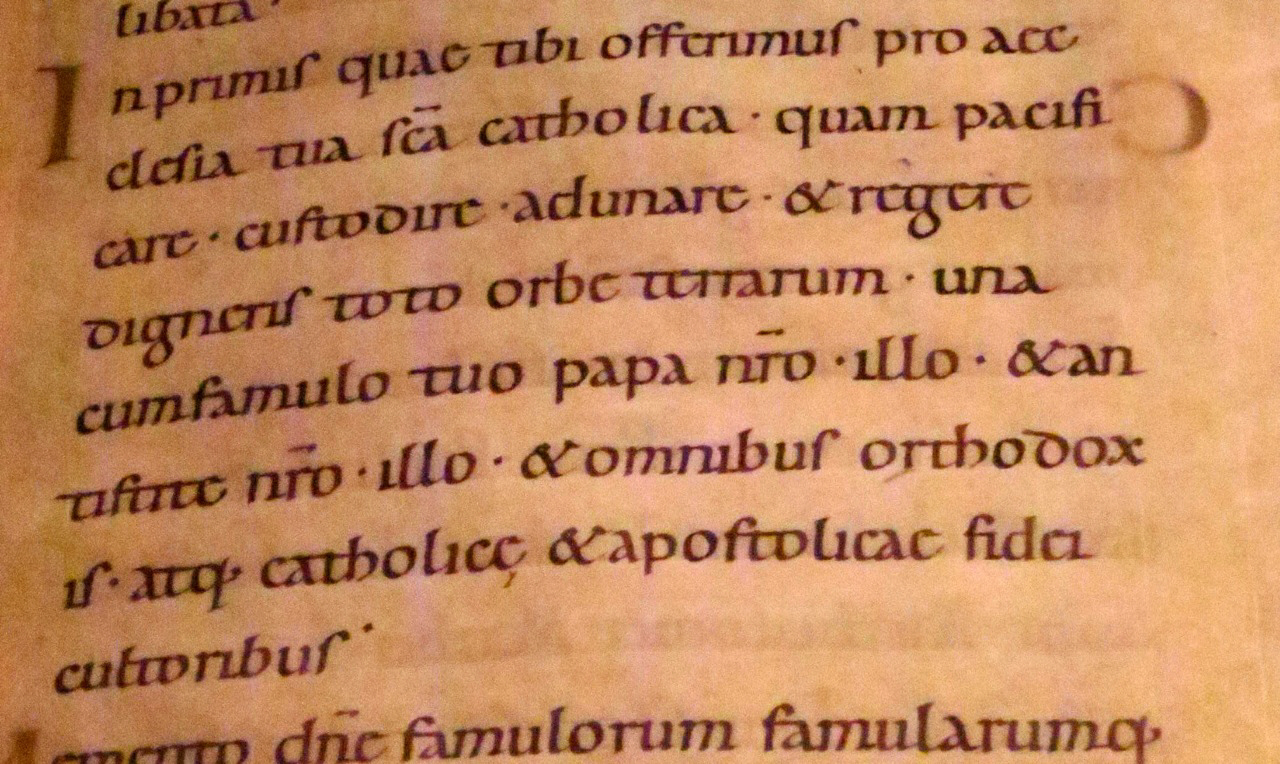
[powr-hit-counter label="2775648"]
